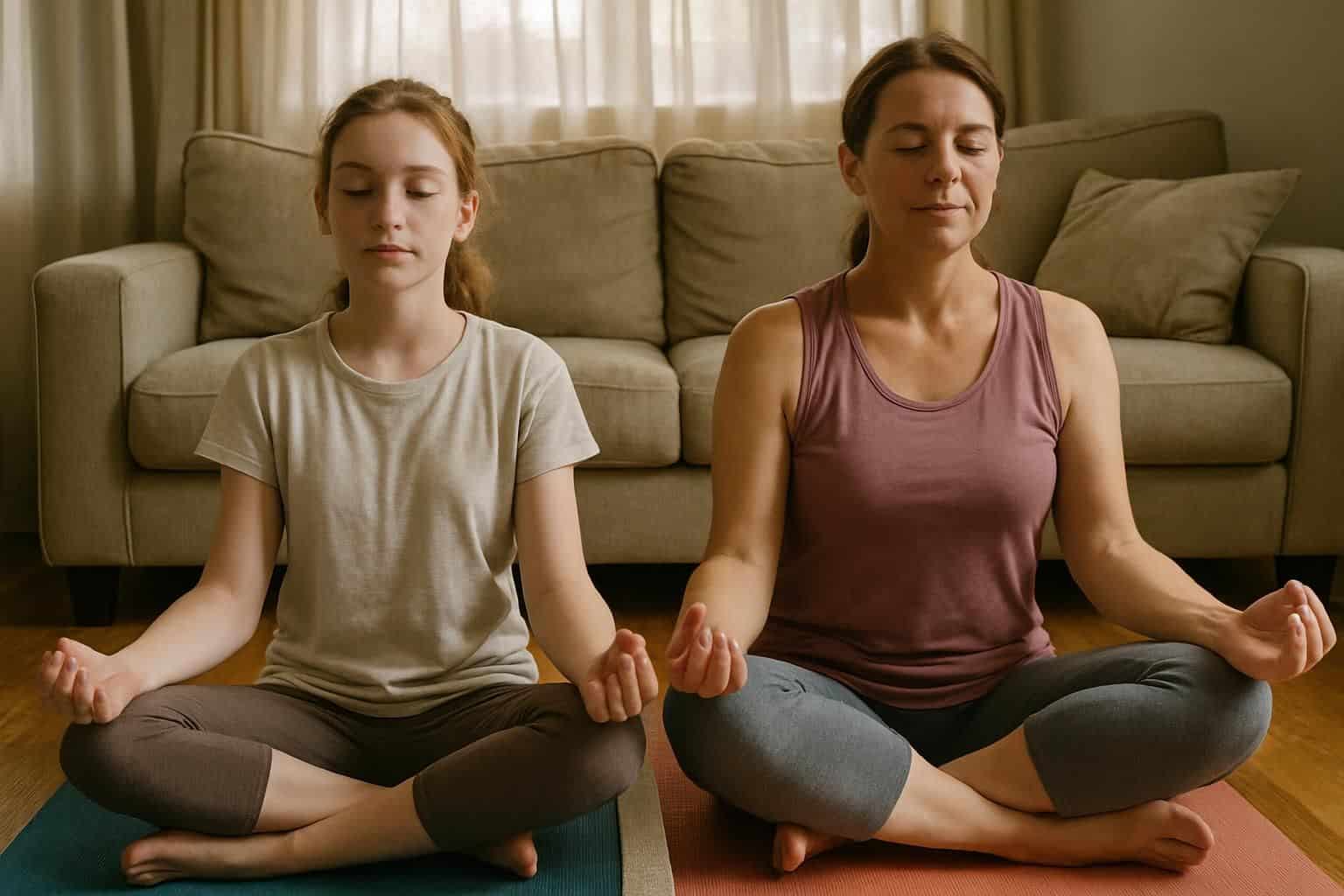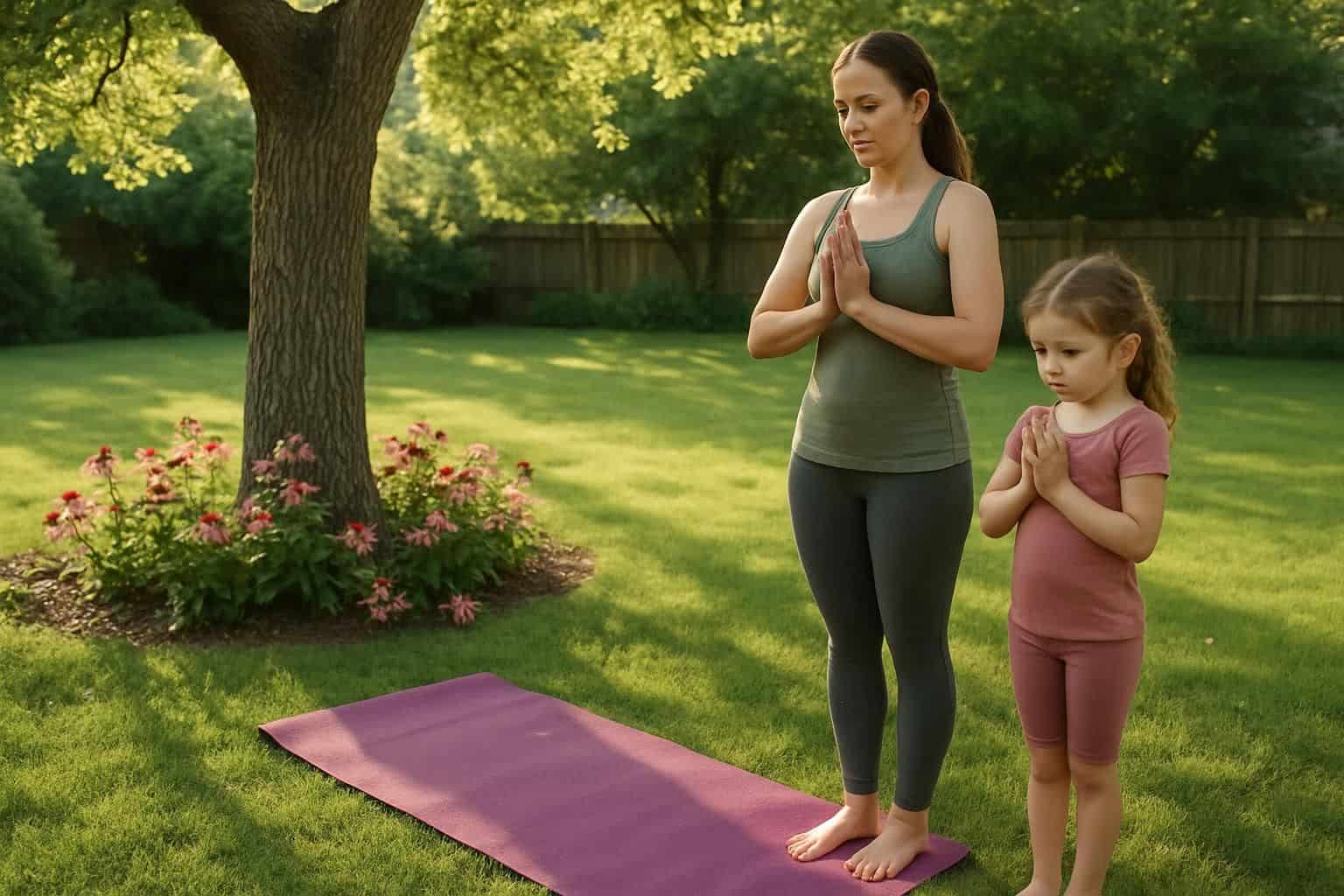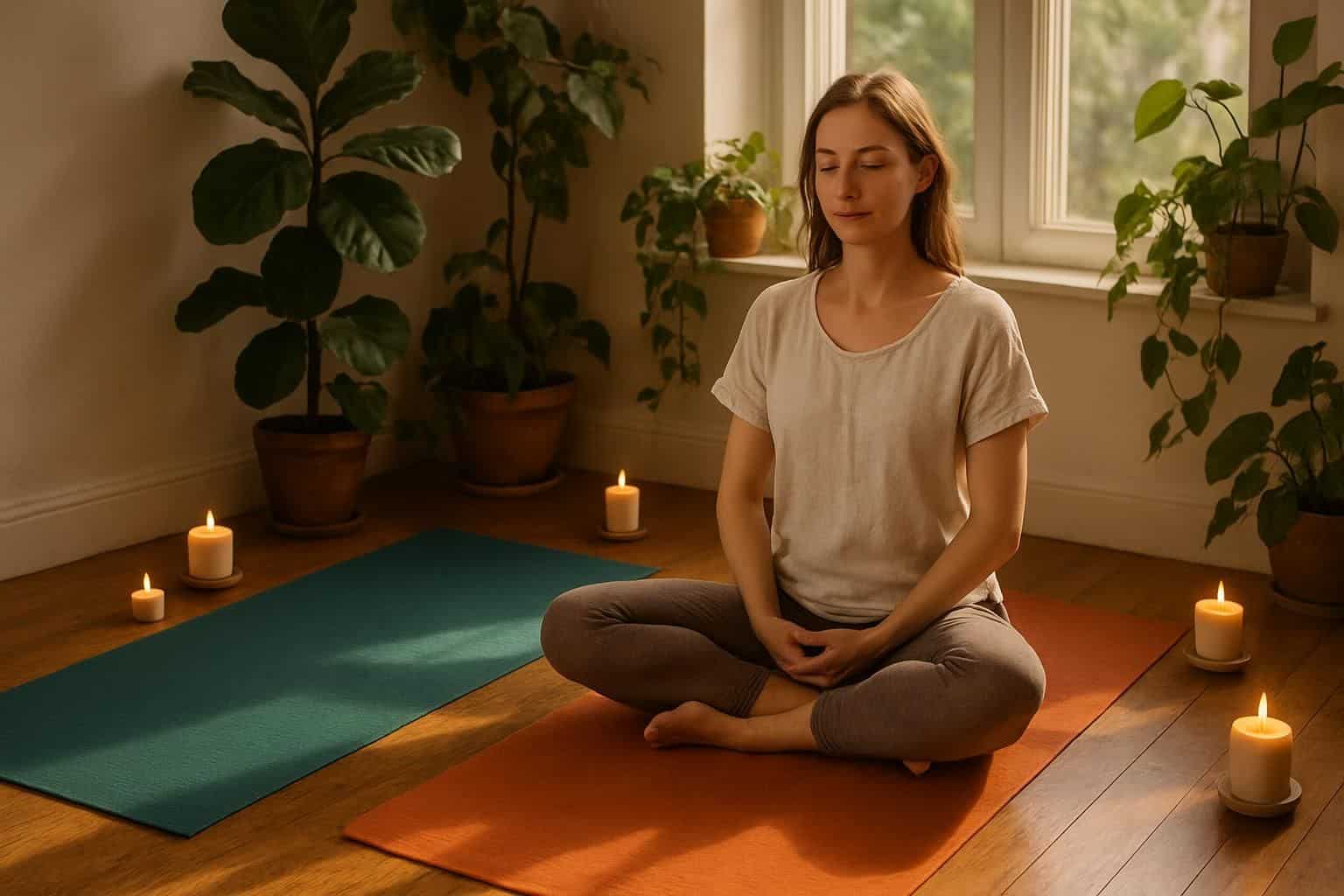Do you struggle to find time for workouts while staying close with your daughter? Studies show that mother daughter fitness can boost emotional ties, support trust, and improve health for both of you.
In this blog, you’ll discover 7 simple workout ideas and fun activities that will help build stronger bonds between mothers and daughters. Keep reading for easy ways to get active together!
Key Takeaways
Working out together helps mothers and daughters bond emotionally, build trust, and stay healthy.
Exercising side-by-side creates a comfortable, open atmosphere—perfect for honest talks, easing stress, and lifting moods.
Regular mom-daughter fitness sessions help prevent chronic illness, boost mental wellness, and enhance self-esteem.
Fun choices range from yoga or brisk walks to strength training (try Aqua Bags for variety!) and lively dance classes.
Picking enjoyable moves, setting common fitness goals, and marking achievements together make great memories beyond improving physical health.
Table of Contents
The Importance of the Mother-Daughter Bond

The mother-daughter connection shapes many women’s lives. It starts with childhood affection, survives tricky teenage tensions, and matures into adult friendships. Mothers strengthen their daughters’ self-confidence through daily acts of care and support.
My own mom showed me how valuable exercise could be—we started doing squats together every Sunday morning. Those simple fitness sessions gave us time to chat openly about life, and get stronger together.
According to supplements company USANA Health Sciences, close bonds like these boost mental and physical health.
A mother’s love is the fuel that enables a normal human being to do the impossible.
Mother-daughter pairs who stay active together also enjoy lasting health advantages. Girls who share workouts with their moms pick up good fitness habits early. They enjoy better emotional health and increased strength to handle life’s tough moments.
Shared exercise builds trust and creates safe spaces for honest conversation and closeness. This secure connection reduces stress levels and increases happiness for both mother and daughter.
Let’s explore even more ways exercising together can improve your lives.
Benefits of Exercising Together

Working out with your daughter creates a special bond that goes beyond just getting fit. Sweating together builds trust and teaches both of you to cheer each other on through tough moments.
Strengthening emotional connections

Mother-daughter workouts go beyond fitness—they strengthen bonds in special ways. Doing physical activities together boosts relationship happiness and emotional closeness. Cheering each other through tough yoga poses or counting reps side-by-side develops trust that spills over into everyday life.
Many active moms notice workout time becomes a comfortable space where their daughters open up about school issues, friendships, or worries. Natural chats flow easily because exercise eases tension and creates a relaxed vibe perfect for talking freely.
Close mother-daughter connections strongly shape a young girl’s self-esteem and emotional well-being. Sharing regular physical activities allows both to disconnect from screens and spend quality time face-to-face.
One personal trainer who often coaches family pairs notes exercise teaches mutual respect—moms see their daughters as independent, growing people, while daughters grow to admire their mother’s strength and effort.
Over time, these shared fitness moments form lasting, meaningful memories you can both treasure forever.
Building mutual trust and support

Exercising alongside your daughter builds a solid bond rooted in trust. Tackling fitness goals together helps you both count on each other for motivation and support. Moms and daughters who stay active side by side often end up sharing more than workouts—they open up about their feelings, hopes, and even worries.
Talking openly this way creates trust that reaches beyond gym time.
The strength we build together isn’t just in our muscles—it’s in our relationship.
Facing fitness challenges together teaches you both to encourage and push each other through hard spots. A mom might spot her daughter during weight training, or a daughter might cheer her mom through those final tough reps—this back-and-forth support creates powerful teamwork.
That kind of partnership extends into everyday life, helping both of you feel appreciated and understood. Many families say working on shared fitness goals builds trust, patience, and above all, a stronger connection.
Improving physical and mental health

Mother-daughter workouts strengthen both body and mind. Regular exercise combats chronic illness, builds muscle, and keeps hearts healthy. Many moms who become a muscle mommy discover extra energy to tackle daily chores.
Girls also build self-confidence through these fun fitness routines. Bonds built while exercising open safe spaces to talk about feelings, worries, and everyday stress.
Family fitness sessions release brain chemicals that lift spirits and fight sadness. Daughters who watch their strong moms stay fit often adopt lifelong exercise habits for themselves.
According to aarp.org, kids doing workouts with family members also earn better grades at school. Teaming up for physical activities teaches helpful life skills, useful long past the playground or gym.
Popular Mother-Daughter Fitness Activities

Discover fun fitness activities that both mothers and daughters can enjoy together – from yoga that builds flexibility to dance workouts that boost mood – and learn how these shared exercises create lasting bonds while improving health for women of all ages.
Yoga and meditation

Yoga gives moms and daughters an amazing chance to build strength and grow closer at the same time. Easy poses, like the tree pose or simple partner stretches, help both of you become stronger while bonding.
Many moms notice how doing yoga with their daughters moves the conversation away from body size and onto muscle strength—just like Lacee Green points out. Last year, I began yoga with my teenage daughter, and now our Saturday mornings feel special, almost sacred.
Yoga doesn’t just strengthen your body—it strengthens your relationship with those you practice with.
Meditation matches yoga nicely as another great mom-and-daughter activity. Sitting quietly for just five minutes boosts self-esteem and develops useful stress-coping skills. Research reveals family-centered physical activities encourage regular workouts in the long run.
https://www.youtube.com/watch?v=f8BYEe91GoE
No fancy gear is needed—two mats and an open attitude are enough. The calm moments after yoga often inspire relaxed chats that turn into wonderful memories beyond the exercise itself.
Walking or jogging

Taking walks or going jogging offers moms and daughters a great chance to bond, staying fit while they build stronger relationships. No special equipment needed—just comfortable shoes, a nice trail or sidewalk, and you’re good to go.
Studies show exercising together boosts happiness, bringing more laughter and easy conversations as you move. Many strong, athletic moms started out with these simple and effective first steps.
Something special happens when you stride side by side, taking in the outdoors and fresh air. Both your bodies release endorphins—those natural mood boosters—brightening your spirits and easing stress.
Matching pace builds trust between mom and daughter, letting each support and encourage the other along each mile. Girls often feel better about themselves seeing their moms prioritize fitness, while moms love seeing daughters grow stronger, happier, and more confident.
Strength training
Strength training gives moms and daughters the ideal chance to build strength—and connection—together. Last year, my daughter and I began using Aqua Bags for partner squats, and our workouts quickly became a favorite bonding activity.
These exercises go beyond just building muscle; they foster trust, teamwork, and genuine closeness. The Aqua Bags provide just the right resistance, making our sessions effective yet surprisingly fun, while shaping our arms, legs, and core.
Lots of moms find weightlifting with their daughters improves physical wellness and boosts self-esteem, too.
Partner workouts keep both of us accountable and on track with our fitness goals. Even on days we’re tempted to skip exercise, our commitment to each other motivates us to show up and get moving.
This shared effort has turned working out into a habit far easier to maintain than solo exercise ever was. Strength training helps us value the incredible things our bodies can do—not just how we appear in the mirror.
Building muscles together has become one of our most enjoyable mother-daughter activities.
Dance workouts
Switching your workout routine from strength exercises to dance offers an enjoyable shift for mother-daughter pairs. Dance workouts mix fun and fitness perfectly—giving you a cardio boost while learning fresh moves together.
Unlike weightlifting sessions, dancing keeps your heart rate up and your spirits high. One study focused on African-American girls and their moms saw impressive benefits from dance classes.
In that 12-week program, participants danced three times a week for 60-minute sessions. The lessons covered African rhythms, Jazz routines, and Hip-Hop choreography. Girls who danced with their mothers showed significant jumps in energetic physical activity levels.
Their moms experienced more moderate-to-intense exercise compared with mothers whose daughters danced alone.
Dance activities help moms build muscle and lift self-esteem in both generations. You can explore various dance forms like those used in the study—vibrant African beats, smooth Jazz steps, or lively Hip-Hop twists.
Physical movement improves body health and creates lasting memories to deepen your mother-daughter bond. In fact, many mothers say they feel closer to their daughters after regularly dancing side by side.
Dancing at home can also help you lose weight by dancing—right in your own living room, with no special studios required!
Tips for Starting a Mother-Daughter Workout Routine

Starting a fitness routine with your daughter takes both planning and patience. A muscular mother can model healthy habits while building her daughter’s self-worth through shared physical activities.
Set shared fitness goals
Setting fitness goals as a mother-daughter team lays a solid foundation for your joint workout routine. Before you jump into your exercises, chat openly about the results each of you wants.
A mother with strong muscles might focus on keeping her strength, while the daughter works at boosting stamina. Aim for health-related targets instead of appearance-driven tasks. So instead of a vague goal like “drop 10 pounds”, pick clear ones—maybe “run a local 5K race”, or “do yoga together twice a week”—which help build self-confidence beyond just looks.
The greatest gift a mother can give her daughter is the example of how to care for her body with love and respect, not criticism.
Goals are most effective if each of you fully agrees with them. Write your plans down and hang them up in a spot you’ll both pass daily. Seeing them often keeps you motivated, especially during hectic days.
Give yourselves small rewards along the way—buy some comfy workout clothes or enjoy a fun movie night. Having support from each other boosts your odds of hitting those milestones, way better than tackling them solo.
Choose activities you both enjoy
Discovering fitness activities that both mom and daughter enjoy forms the perfect foundation for shared workouts. My daughter and I started with yoga—it relaxed me, but she found it dull.
We quickly shifted to dance workouts, laughing and smiling as we broke a sweat. It’s important to chat openly about what types of exercise each person prefers. Some moms might love relaxing nature walks, while their daughters could prefer team sports or energetic workout classes.
Find that middle ground—a fitness routine that genuinely excites you both.
One easy trick is writing down five workout activities each, then comparing lists to spot the common choices. This approach led my daughter and me to our currently favorite activities—hiking local trails and swimming.
On days our choices differ, we pursue our workouts separately, allowing each other personal space and fitness independence. This balance keeps exercise fun, fresh, and pressure-free.
Establishing a consistent fitness schedule creates special shared moments and easily fits exercise into your weekly habits.
Establish a regular workout schedule
Consistency matters more than intensity for fitness success. Choose two or three days each week that fit your and your daughter’s schedules. Then, clearly mark these workout dates on a shared fitness app or calendar to keep them official.
My daughter and I started on Tuesday evenings and Saturday mornings—which gave us something exciting to look forward to midweek and on weekends. Treat these sessions as important appointments, something you can’t skip without a solid reason.
Keeping your workouts consistent helps build long-term healthy habits. Try beginning with 30-minute sessions, then slowly increase your workout length as your fitness improves. Many moms prefer mornings, getting their exercise done early before the busy day begins.
Teens usually enjoy afternoon sessions, once school lets out. Finding times that genuinely fit both your lifestyles is key. After establishing this regular workout routine, your next step is making fitness fun for you both.
Celebrate milestones together
Tracking fitness goals with your daughter builds special moments and a tighter bond. Celebrate every milestone—big and small. Did you achieve a month of daily 10,000-step walks? Treat yourselves to a relaxing spa day together.
Finished your first 5K as a team? Commemorate the event with matching mom and daughter tattoos or some fun workout clothing.
These joyful rewards create lasting memories and keep the motivation flowing. Your daughter also learns the value of hard work and develops lifelong healthy habits.
Little wins count just as much. Give each other high-fives after finally mastering a challenging yoga position, or capture your pride in a silly, sweaty selfie after beating your personal best.
Keep a fitness journal for both of you to record accomplishments, thoughts, and memories. You’ll build up a collection of shared experiences that you’ll love flipping through someday.
Best of all, these enjoyable moments turn exercise from something dull into a lively, exciting activity you can share with your favorite workout buddy—your daughter.
How to Make Fitness Fun for Both

Turning fitness into a fun bonding time means thinking outside the standard gym routine. Mix things up with friendly contests, outdoor adventures, or trying the latest workout trends together to keep both mom and daughter excited about staying active.
Try fitness challenges or competitions
Fitness challenges can brighten up mom-and-daughter workout routines. Start a weekly family challenge to measure steps taken, miles run, or minutes spent exercising. A bit of friendly competition keeps things fun and adds extra motivation.
Many mothers and daughters keep it playful with mini-contests—like “longest plank hold” or “most push-ups done per minute”. These quick games turn workouts into something enjoyable, not just another task.
Summer is the best season to kick off a fitness challenge. You can set up a backyard obstacle course, testing various skills while building teamwork and trust. Use charts or fitness apps to track weekly progress and notice your improvements.
The best part is, these challenges fit any fitness level, so moms and daughters of all ages and abilities can fully join in. Celebrating together—even the smallest successes—brings you closer while boosting health and wellness.
Incorporate outdoor activities
Once you’ve tackled indoor fitness challenges with your daughter, why not take your workouts outside? Exercising in nature gives you the ideal setting to bond while moving your bodies.
Family hikes are a fantastic choice for moms and daughters at any fitness level. You get to chat casually, stroll along scenic trails, and soak in stunning views together. Plus, natural surroundings help you both reduce stress levels and lift your spirits.
Another great outdoor option is a family bike ride. You and your daughter can explore new neighborhoods or biking trails, pack a tasty picnic, and turn the adventure into a full-day outing.
Or consider beach volleyball—you’ll have some playful competition and practice teamwork at the same time. Local playgrounds can also offer clever, cost-free exercise choices. Use the swings, monkey bars, slides, and open areas for fun circuit workouts that challenge you both.
Experiment with new workout trends
Fitness trends come and go fast—trying new workouts with your daughter keeps exercise fresh and fun. Last summer, my daughter and I signed up for aerial yoga classes. We stretched while dangling from silky hammocks, laughing as we spun and lost balance! Popular options like High-Intensity Interval Training (HIIT) can give busy moms and daughters a quick, effective 20-minute session.
Barre workouts also deliver fun, blending ballet moves with muscle-building exercises. Dance fitness classes such as Zumba turn workouts into lively dance parties—it’s easy to forget you’re exercising!
Online workout classes and fitness apps help you test fresh routines from your living room couch. My teenage daughter got me hooked on virtual reality fitness games. We fight monsters and keep rhythm to music—all while the games record our moves.
Tech-driven workouts appeal to teens and still offer a solid sweat session for moms. Sharing new experiences creates inside jokes and builds a close bond between you. The greatest part? No one needs to start with expertise; you can both learn, make mistakes, and get better together.
The Role of Fitness in Building Lifelong Memories

Doing workouts together can build lasting, powerful bonds. My daughter and I still laugh about our paddleboard yoga adventure—both of us tumbling into the lake just minutes after getting started.
Moments like those become special stories, packed with humor and meaning, that deepen our connection. Being active side-by-side makes it easier to talk, knocking down barriers that busy days build.
Many moms even notice their teens share more openly while walking, compared to sitting across from each other at home.
Physical activity leaves special markers in our brains, connecting movements to strong emotions. The happiness from running your first 5K with your daughter, or the pride of finally holding a tricky yoga pose, creates lasting memories, brightly stamped in your mind.
These joint moments of success boost trust, confidence, and comfort between moms and daughters. Plus, exercise’s natural mood lift helps both of you relax and enjoy making those memories together.
As new fitness trends continue to appear, exciting possibilities await mother-daughter activities ahead.
How Will Mother-Daughter Fitness Evolve in 2025?

Mother-daughter fitness routines will get exciting upgrades by 2025. Virtual reality workouts will allow moms and daughters to climb mountains or dance on tropical beaches—all without stepping outside their homes.
Family-focused smart fitness trackers will monitor each person’s progress, suggesting enjoyable activities matched to both interests and abilities. Special fitness apps will offer unique mother-daughter challenges, making workouts feel like games rather than chores.
New tech will also erase distance barriers, keeping family fitness simple and fun. Mothers and daughters living far apart can meet up through online classes or shared connected equipment—the next best thing to actually being together.
Social media groups focused on mother-daughter fitness pairs will expand, offering friendly spaces to share advice, swap tips, and celebrate achievements. Fitness sessions will become shared bonding experiences—building stronger bodies and deeper connections at the same time.
People Also Ask
What are some enjoyable mother-daughter fitness activities to explore?
Consider trying yoga sessions, dance classes, hiking trails, cycling adventures, swimming laps, or sports like tennis. These activities boost your health while letting you bond and create great memories—perfect ways to spend quality time together.
How can fitness activities enrich our mother-daughter relationship?
Fitness activities create common goals and shared experiences, bringing you closer together. Working out side by side builds trust, improves communication, and releases feel-good brain chemicals that keep your mood happy and positive.
Can moms and daughters with different fitness abilities still exercise together?
Absolutely! Many exercises easily adapt to various fitness levels. Relaxed walks, easy swims, or gentle yoga poses let you enjoy exercising together at your own pace. Keep the focus on having a good time rather than competing or worrying about performance.
What if my mom or daughter isn’t excited about fitness?
Begin with easy activities that feel more like play rather than formal exercise. Dance around the house to your favorite tunes, take leisurely walks outdoors, or challenge each other to a fun active video game. The trick is finding something enjoyable, making fitness feel less like a chore—and more like quality bonding time.
References
https://pubmed.ncbi.nlm.nih.gov/12569218/
https://pmc.ncbi.nlm.nih.gov/articles/PMC6066471/
https://knewhealth.com/10-fun-family-fitness-activities-to-get-everyone-moving/
https://www.linkedin.com/pulse/family-fitness-fun-7-outdoor-activities-bond-your-kids-matt-fox-iqhse
